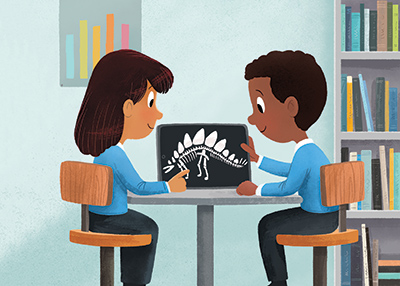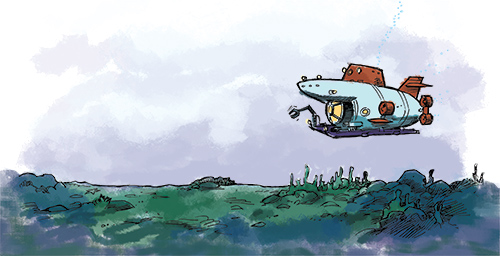BJU Press’s elementary science product line equips students to apply science to life by building foundational knowledge and skills with pre-assessments, scaffolded instruction, spiral review, and hands-on activities. Explorations in scientific inquiry give students opportunities to observe, classify, measure data, analyze data, make inferences, and communicate their findings. When they interact with and use models, students are better able to explain and describe their observations as well as make predictions about scientific principles they’ve learned. Collaborative STEM activities give students opportunities to design, test, and refine engineered solutions to real-world problems.
Program Approach for Elementary Science
The BJU Press elementary science program begins the process of teaching students how to use scientific knowledge throughout their lives. Science is far more than a collection of facts. Students can use the knowledge and skills they learn in science classes to change our world and improve it for others. Our program begins by shaping a biblical worldview of science for students so that they can develop a good foundation for science learning, starting from Creation. They will get to engage in solving real-world problems so that they can see what they are capable of accomplishing as image-bearers of God. They will learn how to follow scientific methods, use models, and interpret and apply scientific knowledge through the lens of biblical teaching. Because of the worldview claims that fill modern science, Christian students must learn how to evaluate the information they encounter. We are dedicated to making science useful to students so that they can apply it to their lives for the glory of God.
Foundational Understanding of Science
To succeed in science learning, students need educational materials that go beyond a collection of science facts. They need to form a correct starting point for those facts, and they need to achieve science literacy. The BJU Press elementary science materials will introduce them to four key biblical worldview themes that will help them shape their understanding of science. First, based on the authority of Scripture, our science program establishes for students a young-earth model that views the earth and the universe as being about 6,000 or 7,000 years old (Gen. 1:1; Heb. 11:3). And the events of the Flood have significantly changed the surface of the planet. Second, students can find order in nature because it was designed by a Creator. Third, humanity was created in the image of God, which helps students understand how we are above animals and responsible for the care of God’s creation (Gen. 1:26–28). Finally, students will understand that the end goal of science is to glorify God and to use science wisely for Him.
The elementary science materials also will help students build skills in reading informational science texts, will introduce them to using science tools, and will teach them how to read and interpret tables, charts, and graphs. The student edition will also give students a balanced introduction to science topics on a level that they can understand and assimilate, including introductions to STEM careers. It encourages students to read for information, a skill critical for learning. Activities allow students to put science skills into practice and to demonstrate their knowledge and understanding of scientific concepts.
Engaging Students in the Work of Science
Success in science learning also demands hands-on activities that get the students thinking about the world around them. Both the student editions and activities include guided discovery activities, inquiry- and project-based investigations, and STEM activities. These will call the students’ attention to real-world problems that can be solved by using science skills. Many of these activities encourage students to collaborate with each other, helping them to learn 21st century skills that scientists need to be effective, such as cooperation, time management, and problem-solving.
Using Models
Many of the activities require students to construct and use models of real-world principles. Model use is an important aspect of science learning because scientists can’t always observe an object or principle directly and must use a model to replicate what happens in real life. Interacting with these models helps students to explain and describe their observations as well as make predictions about those principles. However, using a model also reveals an important aspect of science learning: science has limits. A model cannot be exact, and only so much can be learned from one. Similarly, scientists are limited by the use of models and by their own understanding of real-world principles. Only the Bible has the authority to influence how we make decisions in science.
Using Biblical Teaching to Interpret and Apply Knowledge
Scientific knowledge is useless in a vacuum because students need to be able to understand and use the knowledge they gain. The worldview lessons in the student editions will help the students to interpret nature (including fossils, life, stars, earth, and the solar system) through the lens of the Bible’s story. Nature appears designed because it is. The activities support those lessons and give students an opportunity to apply what they have learned, using and developing their creativity and problem-solving skills. Ultimately, the BJU Press elementary science materials teach students to view the natural world as belonging to God. We can glorify God because of His creation. Scientific knowledge enables students to both care for God’s world effectively and to help others.
Vision
To equip students to apply science to life by observing and analyzing scientific information and by evaluating scientific models from a biblical worldview.
Goals
- Develop a foundational understanding of scientific knowledge and skills
- Guide students in applying scientific knowledge and skills in ethical ways to solve real-world problems, using activities that include collaborative STEM experiences
- Use models to explain and describe observations and make predictions
- Enable students to interpret and apply scientific knowledge through the lens of biblical teaching
Materials
Student Text
The student edition provides grade-appropriate information through text, diagrams, graphs, charts, and annotated photographs and illustrations. Each book also includes Quick Check questions, a glossary, and an index. The Quick Check questions use highlevel questioning to promote understanding and critical-thinking skills. The student edition also contains an introduction to each investigation, exploration, and STEM activity.
Teacher Edition
Each teacher edition includes guided instructions for every lesson as well as useful information about science inquiry or process skills, the management of activities, and grading. Most of the lessons also include additional background information, crosscurricular links, and science activities. The teacher editions, combined with the student editions, also include frequent and varied opportunities for pre-assessment and skill measurement. Additionally, the teacher edition includes guidance for anticipating and overcoming common student misconceptions in science as well as opportunities for differentiated instruction, ensuring that all students have opportunities to grow their science skills.
Activities
The activities provides a variety of pages to aid the students’ understanding. Activities differ among grades and include investigation, exploration, STEM, study guide, preview, reinforcement, enrichment, Bible Connection, technology, and expansion pages.
Assessments
Assessment packets contain one age-appropriate test per chapter, covering the most important concepts taught in the lessons. Although tests are important, BJU Press does not recommend that they be used as the sole means of determining the student’s grade. The assessment packet also contains a tailored rubric for each investigation, exploration, and STEM activity.
Scope & Sequence

Science 1
General Science
Science, scientists, the five senses, STEM: the engineering design process (ask, imagine, plan, make, make better, share), a scientist’s worldview, process skills (observe, classify, measure, infer, predict, communicate) science tools (hand lens, ruler, measuring cup/beaker, balance scale, thermometer), the scientific method (problem, hypothesis, materials, procedure, observations, conclusions)
Life Science
Plants
Living things, nonliving things, needs of plants (light, air, water, dirt, space), ways people use plants, result of sin, parts of plants (roots, stems, leaves, flowers), life cycle (seed, seedling, adult plant), parents and young
Animals
Environment, needs of animals (air, water, food, shelter, space), classifying animals (fish, birds, mammals), parts of animals, life cycle (robin), parents and their offspring, result of sin
Our Bodies
The Human Body
Animals and people (similarities and differences), parts outside (head, arms, legs), parts inside (bones, muscles, heart, lungs, brain, stomach)
Care for the Human Body
Be kind to others (in words and actions), healthy habits (for a strong body, to keep germs away, to keep germs away from others, for strong teeth), safe habits (at play, in the car, at home, in the community)
Earth-Space Science
The Earth and Its Lights
Beginnings, earth’s rotation, sun (characteristics, path), stars (characteristics, star pictures), moon (characteristics, path, phases)
Seasons
Earth’s revolution and tilt, cycle of seasons, characteristics of winter, spring, summer, fall
Weather
Temperature, wind, the water cycle (clouds, rain, sleet, hail, snow), what a meteorologist is and does
Physical Science
Light Energy
Beginnings of light, natural or manmade light, light and objects (transparent, translucent, opaque), shadows, characteristics (illuminates, how light travels)
Sound Energy
How sound is made, how sound moves, sound and matter, how sound is heard, how sound changes (volume, pitch)
Communicating with Light and Sound
Around home, around school, around the community; additional worldview learning

Science 2
General Science
What Science Is
Science, scientists, importance of science, a scientist’s worldview, science inquiry skills (observe, classify, measure, infer, predict, communicate), science tools (hand lens, ruler, beaker, thermometer, balance), scientific method (problem, hypothesis, materials, procedure, observations, conclusions), STEM: the engineering design process (ask, imagine, plan, make, test and make better, share)
Physical Science
What Matter Is
Origin of matter, describing matter, properties of matter (color, shape, size, temperature, hardness, texture, ability to sink or float), classifying by property, states of matter (solid, liquid, gas)
How Matter Changes
Temperature and matter, solids to liquids, liquids to gases, gases to liquids, liquids to solids, changing matter (reversible/irreversible, bend/break, mixture), combining matter
How Matter Moves
Force (push/pull, cause/effect), motion (direction, cause/effect), speed (cause/effect), origin of force, kinds of force (friction, gravity, magnetism)
Earth-Space Science
How the Earth Moves
Solar system (origin, planets), Earth (shape, globe as a model), rotation (axis, day/night, sunrise/sunset), revolution (orbit, seasons)
What Makes Up the Earth
Earth’s surface (water, land), inside the earth (studying the earth, geologist, layers of the earth), weathering (water, ice, wind, plants), erosion (wind, water, erosion control), the earth’s moving surface (volcanoes, earthquakes)
What Natural Resources Are
Natural resources (air, water, soil, plants, animals, fossil fuels), pollution, natural resource products (from water, soil, plants, animals, fossil fuels), The Three Rs (reuse, reduce, recycle)
Life Science
How Plants Grow and Change
Living things, nonliving things, plant needs (water, air, soil, light, space), the Fall and plants, parts of plants (roots, stems, leaves, flowers), life cycle (seed and its parts, seedling, adult plant), how seeds travel (air, water, animals)
How Animals Grow and Change
Needs of animals (air, water, food, space, shelter), changes animals make to where they live (by storing food, building shelters), classifying animals (with backbones: fish, birds, mammals, amphibians, reptiles; without backbones: insects, spiders), how animals grow and change, parents and their offspring, life cycle (butterfly, frog), food chain (predator and prey, results of sin)
Where Things Live
Populations, communities, water habitats (ocean, pond, wetland), land habitats (rainforest, woodland forest, desert, savanna, tundra), changing habitats (animals, plants, wildfires, people)
What Fossils Show Us
Creation or evolution, fossils, kinds of fossils (petrified, mold, cast, amber, trace, frozen), plant fossils, insect fossils, dinosaur fossils, dinosaurs (Stegosaurus, Tyrannosaurus rex), end of dinosaurs
How the Human Body Works
Body systems (skeletal, muscular, circulatory, respiratory, nervous, digestive), food, exercise

Science 3
Earth-Space Science
Process skills, science tools, scientific method
The Solar System
Solar system (origin, worldviews, gravity, patterns, the sun and other stars, observing stars and planets), inner planets and moons (Mercury, Venus, Earth and Moon, Mars), outer planets (Jupiter, Saturn, Uranus, Neptune), asteroids, dwarf planets
Weather and Climate
Weather: studying weather, weather tools (rain gauge, thermometer, weather vane, anemometer), clouds (stratus, fog, cumulus, cirrus), precipitation (water, cycle, rain, sleet, snow, hail), wind, severe weather (drought, flood, thunderstorm, tornado, hurricane, blizzard), weather warnings; Climate: climate zones (polar, temperate, tropical), climate change (biblical view, different view, possible causes, God’s promise)
Soil, Rocks, Minerals, and Fossils
Soil: parts of soil, layers of soil (topsoil, subsoil, bedrock), weathering, erosion, conservation; Rocks: sedimentary, igneous, metamorphic; Minerals: properties (hardness, crystal shape, color), uses of minerals; Fossils: biblical view (how and when fossils formed, extinction, adaptation), evolutionary view (how and when fossils formed, extinction, adaptation), Is evolution true?
Life Science
Cells, Tissues, Organs, and Systems
Cells: definition, observing, kinds, parts of plant and animal cells (nucleus, cytoplasm, membrane, wall); Tissues: definition, examples (muscle, nerve); Organs: definition, upper body organs; Systems: definition, skin (largest organ of human body), epidermis (fingerprints), dermis (blood vessels, sweat glands, oil glands)
Plants
Plant life cycle (germination, growth, reproduction, death), photosynthesis (what a plant needs, what a plant produces), uses of plants, plant traits, adaptation (biblical view, evolutionary view)
Cold-Blooded Animals
Classifying animals (vertebrate, temperature), cold-blooded animals (fish, amphibians, reptiles, insects, spiders), characteristics, features to survive and grow, ways to reproduce, life cycles of cold-blooded animals
Warm-Blooded Animals
Warm-blooded animals (birds, mammals), characteristics, features to survive and grow, ways to reproduce, are humans mammals?, taking care of animals, life cycles of animals (birth, growth, reproduction, death), animals and their offspring (same kind, inherited traits, instincts, learned behavior, inherited traits and behavior), studying animals
Ecosystems
Living together (population, community, habitat, ecosystem), resources, eating for energy (producer, consumer, decomposer), types of consumers (herbivore, carnivore, omnivore), living together in groups, food chains, food webs, changes in an ecosystem (balance)
Physical Science
Matter and Sound
Physical properties (mass, volume, matter), states of matter (solid, liquid, gas), changes in states (solids and liquids, liquids and gases), states of water, physical and chemical changes, serving with matter, sound (vibrations, sound waves, characteristics of sound [pitch, volume, uses])
Forces and Motion
Force: fast, slow, direction, kinds (contact/noncontact forces); Motion: directions, distance, speed, how force affects motion, patterns of motion (observations, predictions, unseen patterns, created patterns), work
Electricity and Magnetism
Electricity: electric charges (positive, negative, neutral), static electricity, current electricity; Magnetism: magnets (magnetism, magnetic field, poles), uses of magnets, electromagnets (discovering electromagnets, uses of electromagnets)

Science 4
General Science
Science Inquiry Skills; Science safety tips; Science tools; Scientific investigation; Scientific variables; Modeling in Science; STEM: The Engineering Design Process
Life Science
Living Things
Plant Structures and Functions: internal and external structures, photosynthesis, adaptations, origin of thorns, uses of plants, response to stimuli; Plant Reproduction: flowering plants, parts of a flower, pollination, seed structure, seed dispersal, plant life cycle, other methods of plant reproduction; Invertebrates: arthropods, insects, internal and external structures, protection, defenses, ways of eating, life cycles, metamorphosis, social insects; Vertebrates: internal and external structures, defenses, body systems, adaptations, response to stimuli
Human Body
Digestive system: digestive tract and digestive process; Nutrition: proteins, fats, carbohydrates, vitamins, minerals, healthy diet planning; Skeletal and muscular systems: skeleton, parts of bones, joints, ligaments, tendons, cartilage, muscles, injuries; Eyes: parts of the eye, path of light through the eye, vision correction; Ears: parts of the ear, path of sound through the ear, hearing correction
Physical Science
Energy and Waves
Energy and motion: potential and kinetic energy, energy transfer, collisions, force, weight, speed, motion; Energy and work: energy, forces, friction, gravity, work, simple machines (lever, wheel and axle, pulley, inclined plane); Waves: wave energy, characteristics of waves, wave patterns (circular, transverse, and longitudinal), measuring wavelengths; Light: origin of light, properties of light, light and matter (luminous, nonluminous, transparent, translucent, opaque), light waves, visible spectrum, reflection, refraction, lens; Sound: sound waves, vibrations, amplitude, wavelength, characteristics of sound (pitch, volume, timbre), sound and matter (speed, temperature, absorption, reflection), history of information transfer, digital communication
Earth Science
Earth’s Waters
Water and oceans: water cycle, surface waves, energy transfer, deep ocean currents, surface currents, conservation of water, ocean floor, ocean zones, ocean creatures, bioluminescence, ecosystems in the ocean
Earth’s Surface
Landforms and Changes: rocks and minerals, physical and chemical weathering, soil, erosion and deposition, past and present changes to the earth’s surface, landforms, maps; Natural Hazards: plates, plate boundaries, faults, causes of earthquakes, reducing impact of earthquakes, tsunamis, floods (local, regional, worldwide), volcanoes, dangers of volcanoes, maps; Natural Resources: renewable resources (soil, water, trees, animals), renewable energy resources (hydroelectric, wind, solar), nonrenewable resources (minerals and fossil fuels), choosing energy resources, conservation (reduce, reuse, recycle)

Science 5
General Science
Process skills, science tools, scientific method
Earth Science
Earth
Layers of the earth: characteristics of the core, mantle, and crust; Soil: weathering, erosion, how soil is formed; Minerals: characteristics of minerals; uses of gems, metals, and other minerals; mining; Rocks: formation of igneous, sedimentary, and metamorphic rocks; Fossils: contrasting creation and evolution; Genesis Flood; fossil formation; excavating and restoring fossils; dating and interpreting fossils; Layers of the atmosphere: characteristics of the troposphere, stratosphere, mesosphere, thermosphere, exosphere, and ozone layer; Weather: air; air pressure; temperature; air masses and fronts; winds; precipitation; clouds; storms; tornadoes; hurricanes; weather instruments; reading weather maps
Space
Space technology: regulating heat in spacecraft
Life Science
Living Things
Dinosaurs: fossil evidence; extinction; Biomes: characteristics; plant and animal life in the tundra, coniferous forest, deciduous forest, grasslands, desert, tropical rainforest, mountains, marine and freshwater biomes, wetlands; Ecosystems: environment; population; habitat; food chain; food web; predator and prey; energy pyramid; competition; adaptation; migration; hibernation; symbiosis; instincts; learned behaviors; cycles (seasons, carbon, nitrogen, water); stresses (fires, floods, droughts, man-made); succession ; native and invasive species; extinction; endangered species
Human Body
Respiratory system: nose; pharynx; larynx; vocal cords; trachea; bronchi; lungs; inhaling; exhaling; breathing muscles; asthma and other breathing difficulties; dangers of smoking; Circulatory system: heart; arteries; veins; capillaries; blood cells; blood types; donating blood; excretory system
Physical Science
Energy
Heat: potential and kinetic energy; thermal energy; temperature; changing states of matter; thermal expansion; conduction; convection; radiation; fuel; unwanted heat; applications to space technology; Sound: sound waves; frequency; speed; pitch; volume; timbre; echoes; ultrasound; music; acoustics; Light: electromagnetic waves; properties of waves; visible spectrum; refraction; reflection; colors; mirrors; lasers; electromagnetic spectrum
Matter
Measuring matter: volume; mass; weight; density; States of matter: solids, liquids, and gases; Physical changes: melting, freezing, vaporization, boiling, evaporation, condensation; Atoms and molecules: identifying atoms, molecules, elements, and compounds; Mixtures: evenly and unevenly mixed mixtures; characteristics of solutions



